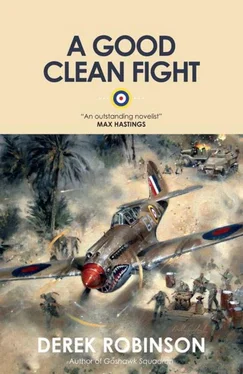“Human error.”
“Just as dead.”
Nobody wanted to discuss it. The Rhodesian patrol of the Long Range Desert Group had been driving across a stretch of sand so flat and so wide and so empty that you could see a lost jerrican at twenty miles, when a pair of RAF Beaufighters found them. There were recognition signals for just such a situation, but the Beaufighters kept attacking despite the recognition signals. Human error. Human dead.
“We bury Harris and then we beat it south,” Lampard said.
* * *
Paul Schramm walked all night and reached the top of the escarpment just before dawn. He stopped there and waited for daylight so that he could find a way down to the plain. His entire body ached with fatigue and his feet felt as if they had been tenderized with steak mallets, but he commanded himself to keep moving, to keep limping up and down, to stay awake.
A couple of hours earlier he had paused for a few minutes. He had stretched out on the ground and rested his feet on a bank of earth because he remembered reading somewhere that infantry on the march always did this when they fell out for a break: something to do with letting the blood drain away from the legs. Schramm was not an infantryman. He was a middle-aged intelligence officer with a bad limp, and when he tried to stand, even the limp was a lost skill. His legs were a wash-out: his feet didn’t want to take his weight and his knees disowned any responsibility for anything. It took him a long time to persuade the leg joints to bend again and the leg muscles to carry his weary body along the broken tracks of the Jebel.
His legs’ readiness to quit surprised him. Thereafter he did not trust them. He kept them working all the way to the edge of the escarpment, and then he refused to sit down, although his knees were wobbly and the soles of his feet were hot with blood.
It had been an interesting walk, probably far longer than it need have been because at first he kept losing his sense of direction in the moonless gloom. The wadis wandered and divided and tried to lead him in circles, so he climbed to the highest spot—a ruined tomb, as it turned out—and tried to identify some stars. While he was at it he decided to dump the grenades, which were heavy and awkward. He left them in the tomb. He set off, looking at the stars but thinking of some inquisitive Arab boy getting blown to bits (or, even worse, half-blown to bits). He went back and retrieved the grenades. For the first time since he had killed him, he thought of Harris.
And with pleasure. Schramm was not a violent man. He rarely allowed himself to lose his temper. Given the chance, he would sidestep to avoid treading on an insect. Yet there was something symbolic about whacking Harris on the head. Harris’s weakness had been his brain. His body was splendidly trained to do its job, but his brain was small and weak, too small to consider the possibility that his victim might have the nerve to wait in ambush.
Now, as he trudged away from this high and lonely tomb, wearing Harris’s right boot and stuffing Harris’s grenades back in the pockets of Harris’s tunic, Schramm was amazed at, and appalled by, his own audacity. One attack: one chance. If he had failed, Harris would have caught him in ten seconds and knifed him in twelve. But he hadn’t failed! And how many unarmed middle-aged gammy-legged German officers had cracked the skull of a young thug of a Commando? Schramm shivered with pride. Then, almost at once, he sneered at himself for being such a caveman. To celebrate killing Harris was to come down to Harris’s level.
Ah, but there was also Captain Lampard. Schramm had made a fool of Lampard, too. Furthermore, he had discovered a few useful things about him. Lampard was quickwitted and intelligent: he had let Schramm run away rather than alarm the Storch. He was cocky to the point of arrogance: he should have kept Schramm blindfolded or at least shut away in a cave, instead of allowing him to watch the patrol at work. And the decision to send only one man to catch him was significant. It was as if Lampard had been showing off to Schramm, minimizing his escape. Lampard’s nerve was strong, but sometimes his judgment was weak. That was worth remembering.
Soon Schramm forgot Harris and Lampard and the rest of them. It took all his attention to concentrate on walking north. He was not convinced that he was steering by the right stars. Then he had a stroke of luck. The British began bombing somewhere—probably another airfield, maybe Benina or Berka, which were near Benghazi; it was unlikely they would go for Barce again so soon—and he saw the wandering stab of searchlights, which he used as a guide. The raid ended; he trudged on and had a stroke of bad luck: he blundered into an Arab camp and set the dogs howling. He backtracked and made a wide detour. Too wide: he roused another camp. The alarm spread and every dog aroused another dog. The night was slashed with howling. Schramm zigzagged miserably through it all, wishing he had a stick to defend himself; Harris’s revolver wouldn’t be much use if some rabid cur tried to savage his legs. Then, for no reason, someone on a hilltop fired at him. The flash and bang so startled Schramm that he stumbled, fell, and cut his knee. Indignation and pain made a powerful cocktail. He dragged Harris’s revolver from its holster and exploded three colossal, deafening shots at the night. He sprawled on the ground and massaged his right wrist, which had suffered from the recoil. The echoes died and even the dogs were silenced by his fit of rage. He crawled away, cursing. But not loudly.
The rest of his trek was a blur of memory. Sometimes he couldn’t remember where he was going, sometimes he remembered where but not why. Fatigue fogged his brain and left his body plodding on in a state of pointless, pigheaded obstinacy. In the end, arrival at the escarpment came as a small shock.
Then dawn, too, came with a speed that surprised him; or perhaps he had dozed off as he ambled up and down. Anyway, there was no sign of a track down the hillside and no sign of Barce airfield below. He was miles and miles off course.
Full daylight arrived before he found a track. Going downhill made his knees ache and cramped his thighs. He told his legs to stop complaining, they should think themselves lucky they weren’t going up. Somehow or other he reached the bottom. Feeble and wet with sweat. He knew the sun was shining because he couldn’t see it. Already the whole sky was one great roasting dazzle.
The obvious thing to do now was to walk across the plain. Schramm squinted and saw no end to it. His legs got this message and threatened mutiny. Everything he looked at shimmered in the heat. Even he was shimmering; trembling more and more violently. Come on , he told himself petulantly, you are an officer, now demonstrate your powers of leadership, you idiot. He demonstrated his powers of leadership. He got rid of the hand-grenades. One by one he pulled the pins and flung the grenades quite a long way. They exploded with very impressive cracks and crumps and pillars of smoke. Total waste of time and effort , he told himself, by now in a thoroughly bad temper.
As it happened, the grenades did a lot of good. A battalion of infantry, eating breakfast at the roadside a mile away, heard the bangs and sent a squad of men to investigate. They found Schramm trudging unsteadily in the wrong direction. An hour later he was on a bed in the hospital at Barce airfield and a Luftwaffe doctor was extracting bits of sock from the ragged soles of his feet. “How far did you walk?” he asked.
Schramm opened his eyes, then shut them. “Only the first two meters,” he said. “I skipped the rest.” He groaned as more skin came away.
“See what happens to you when you tell bad jokes,” the doctor said.
Читать дальше












